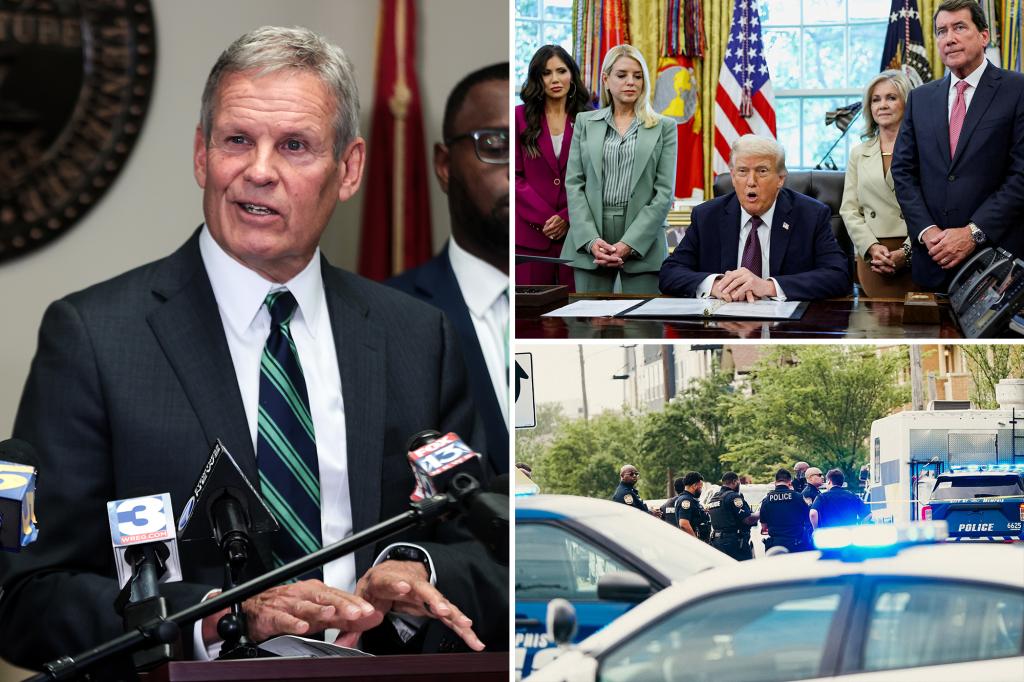NASHVILLE, Tenn. (AP) — For two weeks, Memphis has been bracing for an influx of National Guard troops after President Donald Trump announced his intention to deploy them to the city. On Friday, residents finally learned more about that plan, and it looks to be very different from the deployments in Los Angeles and Washington, D.C.
Tennessee Gov. Bill Lee said Friday that the troops will be part of a surge of resources to fight crime in the city that includes 13 federal agencies and state troopers. The National Guard troops will be from Tennessee, and they will be deputized by the U.S. Marshals Service to support local law enforcement.
The Republican governor said the troops will not make arrests and will not be armed unless local law enforcement officials request it. Lee has previously said he doesn’t think there will be more than 150 Guard members deployed to Memphis, but he later said the number is still in the planning stages.
A post on the city’s website says, “Guardsmen and women will be easily identifiable in their standard uniforms that they wear every day. The guardsmen and women will not be wearing masks.” It continues: “Armored tanks will not be a resource used in this mission.”
“The story of crime in Memphis is about to be a story of the past,” Lee said at a news conference in Memphis where he stood with city, state and federal officials including the Memphis mayor and police chief.
What Lee called the “Memphis Safe Task Force” will begin operations next week, he said. He could not give an exact timeline for when each agency would start to deploy resources to the city, saying it will occur in phases. He did say that agents from the FBI, Bureau of Alcohol, Tobacco, Firearms and Explosives and the Drug Enforcement Agency will arrive next week. He said he will not declare a state of emergency.
Trump first deployed troops to Los Angeles in early June over Democratic Gov. Gavin Newsom’s objections by putting the California National Guard under federal jurisdiction to protect federal property from protests over immigration raids. The guard later helped protect officers during immigration arrests.
Alongside 4,000 guard members, 700 active duty Marines were also sent. California sued over the intervention.
In Memphis, Mayor Paul Young has taken a more pragmatic approach, saying he never asked for National Guard troops but recognized that they would come regardless of his opinion.
“My goal is to make sure that as resources come into our community, we find ways to use them effectively and for the benefit of the residents of our great city,” he said at the news conference. Young noted that crime rates in Memphis have been falling but “we know that we have a lot of work to do to get crime at a level where people really, really feel it.”
Both Young and Lee emphasized that the surge of resources is not intended to be a quick fix but rather a sustained effort.
“It will operate as long as it takes,” Lee said.
“Success looks like Memphis being a safe city, Memphis being a place where people have no concerns about going out with their family, about locating their business,” he said, adding, “When people recognize the city of Memphis as one of the safest places in America, that’ll be success.”
In addition to the federal troops and agents, Lee said the state will provide $100 million to Memphis for public safety initiatives as well as 300 state troopers. That will allow 100 troopers to be on the ground at any one time, a significant increase for Shelby County, where Memphis is located. For its part, the Memphis Police Department has more than 2,000 full-time police officers. The Shelby County Sheriff’s Office has more than 600 law enforcement deputies, with hundreds more who work in corrections.
Trump announced on Fox News on Sept. 12 that he would next send the National Guard to Memphis. He signed an order setting up the task force of law enforcement agencies for the mission on Sept. 15.
Trump has veered back and forth on sending troops to Chicago — at times insisting he would act unilaterally to deploy them and at other points suggesting he would rather send them to New Orleans, Portland, or a city in a state where their governor “wants us to come in.” Last week, he said Chicago is “probably next” after Memphis.
Read the full article here

